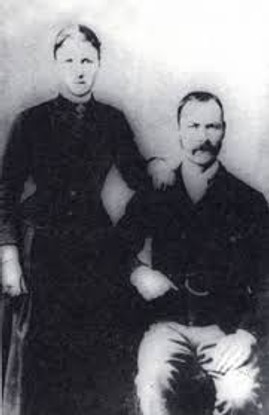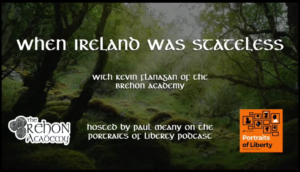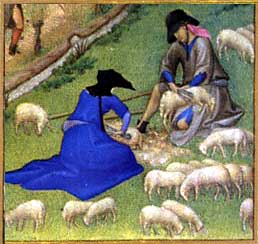The Reverend John O’Hanlon wrote on the topic of the native Irish belief in the fairy-folk in his article titled Fairy Beliefs – Irish Folklore saying they were regarded “by the peasantry to partake of a mixed human and spiritual nature”.
He continues, Although invisible to men, particularly during day, they hear and see all that takes place among mortals in which they have any especial concern. Hence the peasantry is always anxious to secure their good opinion and kind offices, and to propitiate or avert their anger by civil conversation and practices.
Fairies are always mentioned with respect and reserve. It is also considered inhuman to strain potatoes or spill hot water on or over the threshold of a door, as thousands of spirits are supposed to congregate invisibly at such a spot, and to suffer from that infliction. Before drinking, a peasant would often spill a small portion of his draught on the ground as a complimentary libation to the “good people” (O’Hanlon).
While the people sometimes called them an daoine maithe, or ‘the good people’, this was done so out of fear of the faeries, in case the faeries might be listening, and not because they were thought to be actually benevolent.
In some accounts, it is portrayed that the Tuatha De Danann hated the men of Ireland for having driven them from their worldly kingdom into the hills if Ireland; which draws a parallel with the Fallen Angels of the Bible, and the Jinn of Islam. Mounds and tullocks were believed to be faery forts and are still called so to this today; these were the other-worldly and magical domains of the faeries, strange things are said to happen around them, animals would not approach them, people dare not enter near them and farmers dare not level them because of the fear of the wrath of the sidhe dwelling inside.
Regardless of what we think of all this, the faeries were thought to be real and this had a significant influence on the beliefs, and therefore the actions, of the people who held to the superstitions.
Of all of these, the belief in the concept of the changeling was perhaps the most extreme. There was a deep fear that the faeries would snatch away a child or a relative and replace them with one of their own, an imposter. The belief was so strong and the fear so deep that it sometimes even led to the murder of children or relatives who were thought to be changelings.

In 1895, Bridget Cleary was burned to death by her husband Michael and others who were convinced she had been replaced by a changeling. Since his true wife had been snatched away and replaced by the faeries, Michael believed he was just killing the evil changeling who had replaced her. Michael Cleary was found guilty of manslaughter, and spent 15 years in prison. An old Irish nursery rhyme reads, Are you a witch, or are you a fairy / Or are you the wife of Michael Cleary? Changelings have been the subject of stories, songs, poems, and nightmares for a long time.
It was the main theme of W.B. Yeats’ poem The Stolen Child.
THE STOLEN CHILD.
W. B. YEATS
Where dips the rocky highland
Of Sleuth Wood in the lake,
There lies a leafy island
Where flapping herons wake
The drowsy water-rats.
There we’ve hid our fairy vats
Full of berries,
And of reddest stolen cherries.
Come away, O, human child!
To the woods and waters wild
With a fairy hand in hand,
For the world’s more full of weeping than
you can understand.
Where the wave of moonlight glosses
The dim grey sands with light,
Far off by farthest Rosses
We foot it all the night,
Weaving olden dances,
Mingling hands, and mingling glances,
Till the moon has taken flight;
To and fro we leap,
And chase the frothy bubbles,
While the world is full of troubles
And is anxious in its sleep.
Come away! O, human child!
To the woods and waters wild,
With a fairy hand in hand,
For the world’s more full of weeping than
you can understand.
Where the wandering water gushes
From the hills above Glen-Car,
In pools among the rushes,
That scarce could bathe a star,
We seek for slumbering trout,
And whispering in their ears;
We give them evil dreams,
Leaning softly out
From ferns that drop their tears
Of dew on the young streams.
Come! O, human child!
To the woods and waters wild,
With a fairy hand in hand,
For the world’s more full of weeping then
you can understand.
Away with us, he's going,
The solemn-eyed;
He’ll hear no more the lowing
Of the calves on the warm hill-side.
Or the kettle on the hob
Sing peace into his breast;
Or see the brown mice bob
Round and round the oatmeal chest.
For he comes, the human child,
To the woods and waters wild,
With a fairy — hand in hand,
For the world’s more full of weeping than
he can understand.



